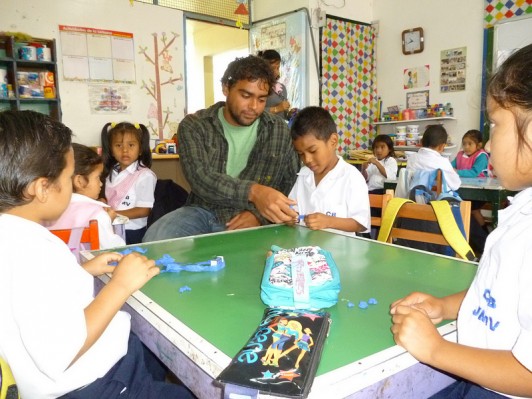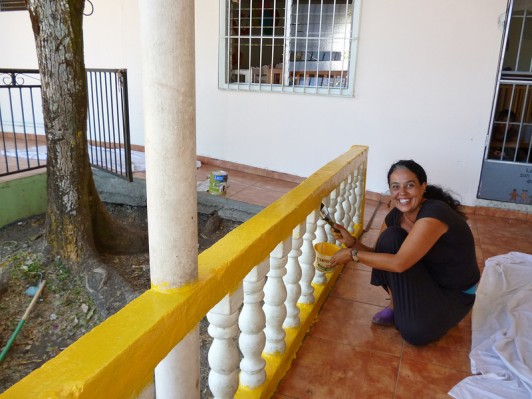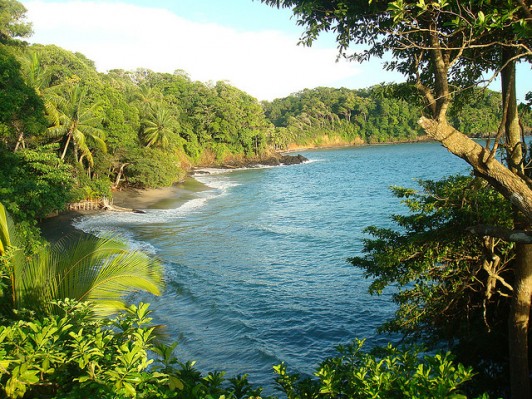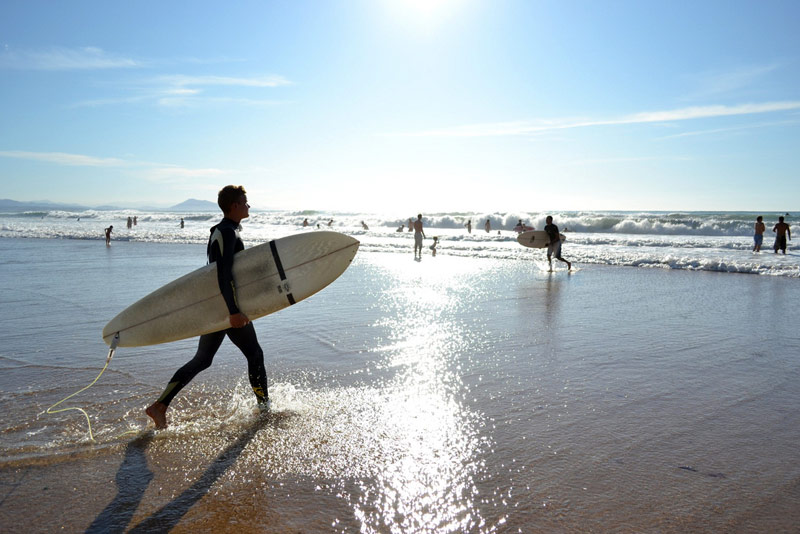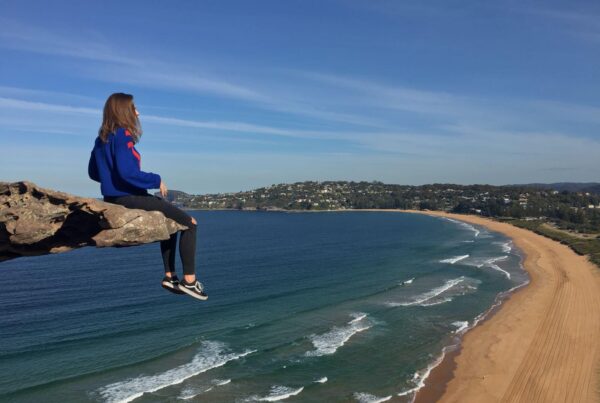Of the world’s 400 million Spanish speakers, around 85% live in Latin America. It’s a diverse place, stretching from the icy blue glaciers of Tierra del Fuego to the sunbaked Mexican desert via the virgin rainforests of Central America. The cultures of Latin America are as diverse as the scenery, each country and city with its own sounds, flavours and tradition, with plenty of native influences alongside the colonial and immigrant ones. This is a place where you can learn Spanish and have the adventure of a lifetime.
But there are many challenges facing Latin American countries, both social and environmental. For one thing there is real poverty, for another the biodiversity that makes some locations so attractive is under threat from human influence. Against this backdrop, our partner schools are working to improve their environmental footprints while offering students an authentic insight into local life, especially through volunteering projects that help the local communities. For students this can be a life-changing experience.
“As a short-stay volunteer from Europe or North America, maybe you will not have a huge impact when you stay here, but I think your perceptions will be changed when you get home and that is one of the biggest things you can take away from the experience,” says Julio J. Santamaria Barria from Habla Ya! in Panama. Maybe you can’t change the world during a short stay, but you will get to see a side of local culture that tourists rarely see and your support certainly helps the organisations. Some students keep contributing to the local projects long after returning home.
Casa Esperanza is one project in Boquete that Habla Ya! and ESL students are actively involved in. The organisation encourages local children to stay in school by picking them up from home in the morning, giving them breakfast and taking them to school. In the afternoons, the children are picked up from school, given lunch and looked after in the centre until their parents finish work. “This is where our students can get involved; helping with activities, playing sports with them and helping to run seminars for things like computer skills and English.” says Julio. The school coordinates with Casa Esperanza and encourages students to share their skills and interests with the charity. “Students enjoy it and find it worthwhile because they are given a meaningful role to fulfil.” Another way that students can use their own skills to help the local community is by teaching English at the school, where free evening classes are run twice a week.
Habla Ya! has a member of staff dedicated to managing its volunteering programs in Boquete (and is looking at appointing one in Bocas del Toro in the near future). This means that students with special skills can work on projects that really benefit from those skills. One example is a local orphanage that helps abused children. Because of the nature of the work, volunteers must be able to speak reasonable Spanish, have experience helping troubled children and be able to commit a month to the project. “We get a handful of students who want to help at the orphanage each year, but it makes a big impression on those students who come.”
Another project that requires more specialised skills runs at Habla Ya! Bocas del Toro. “The Floating Doctors are a group of doctors from the USA who have been travelling around Central America… if one of our students has a medical background they can help out, for example when the Doctors go to a remote community once a month” says Julio. “It’s a great chance to practise medical Spanish, which is apparently very useful in the USA.”
Other projects don’t require any special background and fit nicely around a Spanish course. For example, students can help out with Real Boquete Recycling, which is probably the most advanced recycling program in Panama. It teaches local school children to recycle waste, for which their school receives money which can be spent on resources. “It is making a difference,” says Julio, “the children’s parents are now bringing things to the centre to be recycled! Our students help out by handing out flyers for the project, visiting the schools and talking to the kids, and going to the centres to work directly with the materials.” Students can also visit a local elderly care centre and talk with the residents, play cards, walk with them around town, “this is a nice one to do alongside a Spanish course as you will get to practise the language.”
ESL partner Academia Columbus has centres in Ecuador, Costa Rica and Mexico. Katrin Uphoff explains that the schools want their students “to not just learn Spanish, but also understand the Latin American cultures and learn about their natural resources. For the local people nature plays a very important role in their lives, be it because they live in it (Mayas who live in the jungle, citizens who live close to an active volcano), live off it (agriculture, coffee plantations, beaches, ….) or live with it (the local flora and fauna, which brings their beauty like snorkelling with sea turtles, visiting parks with monkeys and hiking in the snow-capped Andes, but also dangers, like for example the crocodiles in the rivers, the pumas in the jungle and active volcanoes). Nature is intrinsically wrapped up with the country’s history and culture.”
Academia Columbus organises a variety of volunteering projects in environmental as well as social fields. Some examples of environmental volunteering projects include a sea turtle rescue program in Mexico, maintenance and preservation of national parks in Costa Rica, volunteering on the Galapagos Islands, research and/or maintenance and preservation of the rainforests in Ecuador. “To contribute to local social projects we also set up the course Clinical Shadowing and Spanish in Mexico where students study 4 hours of Spanish and then in the afternoon they work for the Red Cross of Playa del Carmen or they go with a local doctor to the Mayan community.”
Environmental issues
Academia Columbus is also working hard on its internal CSR policies. At ESL, we take CSR issues very seriously and actively encourage our partner schools to share our passion. One of the three pillars of sustainability is environmental action and Academia Columbus has a range of positive environmental policies. For example, all student apartments are located within a maximum of 30 minutes’ walk from the centres, which helps cut down on unnecessary travel (as well as being more convenient for all involved). In Mexico and Quito, the actual time is usually considerably less. In the accommodation, there are signs asking students to reduce waste and turn off electrics when not in use. All waste at the schools is separated and students are asked to do the same.
The Academia Columbus schools are also encouraging students to think about the environment through relevant courses and course content. The school in Costa Rica recently ran a poster contest to commemorate World Environment Day, in which students and staff participated by making a poster with a message in favour of nature and the planet.
Katrin is enthusiastic about a new course based on Spanish & Ecology in Costa Rica. “We are still designing the details of this program, but it would be a combination of general Spanish, specific Spanish drawing on vocabulary of Ecology, lectures about Ecology, visits to ecological companies and possibly a volunteering project afterwards. We are aiming to start this course in 2013.”
Official (lack of) support
One challenge for all of our Latin American partner schools is a lack of the kind of state support that is now common in much of Europe. “There are challenges if we think of recycling, for example” says Katrin, pointing out that recycling provision is patchy, except in Costa Rica where separated waste is picked up without a surcharge. In contrast, the separated waste in Mexico is all picked up by the same company and mixed again so “the recycling does not make much sense for now”.
Julio at Habla Ya! is also concerned by the lack of state support in the local communities around his schools, which is partly why there are so many opportunities for students to volunteer. “There is plenty of money in the country but it doesn’t get where it needs to, partly because of corruption. The Floating Doctors are so important in Bocas del Toro because our local hospital is underfunded. Like many of the other local charities and organisations, they are run by foreigners who came here and saw that they could make a difference. The most successful initiatives are usually private ones which can be supported by large companies.”
But a lack of official support is no reason not to get involved. Julio’s advice for anyone considering implementing a community volunteering program is that “it shouldn’t be a side project. We have employed someone to manage our volunteering and charitable work and it has been a big positive step. You can make a difference!”
Contact us to find out more about ESL’s Gap Year programs.
